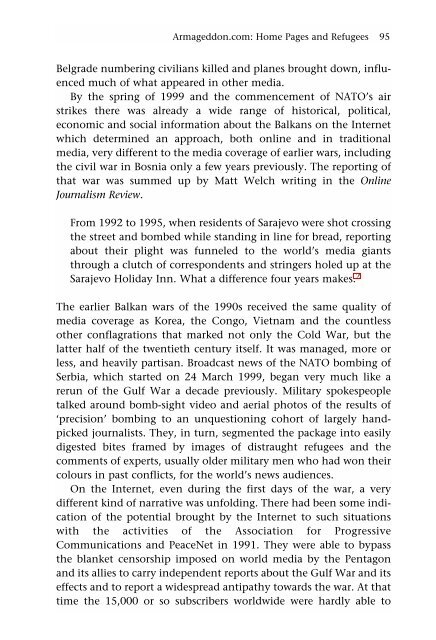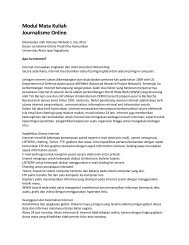Online Journalism - Ayo Menulis FISIP UAJY
Online Journalism - Ayo Menulis FISIP UAJY
Online Journalism - Ayo Menulis FISIP UAJY
Create successful ePaper yourself
Turn your PDF publications into a flip-book with our unique Google optimized e-Paper software.
Armageddon.com: Home Pages and Refugees 95<br />
Belgrade numbering civilians killed and planes brought down, influenced<br />
much of what appeared in other media.<br />
By the spring of 1999 and the commencement of NATO’s air<br />
strikes there was already a wide range of historical, political,<br />
economic and social information about the Balkans on the Internet<br />
which determined an approach, both online and in traditional<br />
media, very different to the media coverage of earlier wars, including<br />
the civil war in Bosnia only a few years previously. The reporting of<br />
that war was summed up by Matt Welch writing in the <strong>Online</strong><br />
<strong>Journalism</strong> Review.<br />
From 1992 to 1995, when residents of Sarajevo were shot crossing<br />
the street and bombed while standing in line for bread, reporting<br />
about their plight was funneled to the world’s media giants<br />
through a clutch of correspondents and stringers holed up at the<br />
Sarajevo Holiday Inn. What a difference four years makes. 2<br />
The earlier Balkan wars of the 1990s received the same quality of<br />
media coverage as Korea, the Congo, Vietnam and the countless<br />
other conflagrations that marked not only the Cold War, but the<br />
latter half of the twentieth century itself. It was managed, more or<br />
less, and heavily partisan. Broadcast news of the NATO bombing of<br />
Serbia, which started on 24 March 1999, began very much like a<br />
rerun of the Gulf War a decade previously. Military spokespeople<br />
talked around bomb-sight video and aerial photos of the results of<br />
‘precision’ bombing to an unquestioning cohort of largely handpicked<br />
journalists. They, in turn, segmented the package into easily<br />
digested bites framed by images of distraught refugees and the<br />
comments of experts, usually older military men who had won their<br />
colours in past conflicts, for the world’s news audiences.<br />
On the Internet, even during the first days of the war, a very<br />
different kind of narrative was unfolding. There had been some indication<br />
of the potential brought by the Internet to such situations<br />
with the activities of the Association for Progressive<br />
Communications and PeaceNet in 1991. They were able to bypass<br />
the blanket censorship imposed on world media by the Pentagon<br />
and its allies to carry independent reports about the Gulf War and its<br />
effects and to report a widespread antipathy towards the war. At that<br />
time the 15,000 or so subscribers worldwide were hardly able to
















